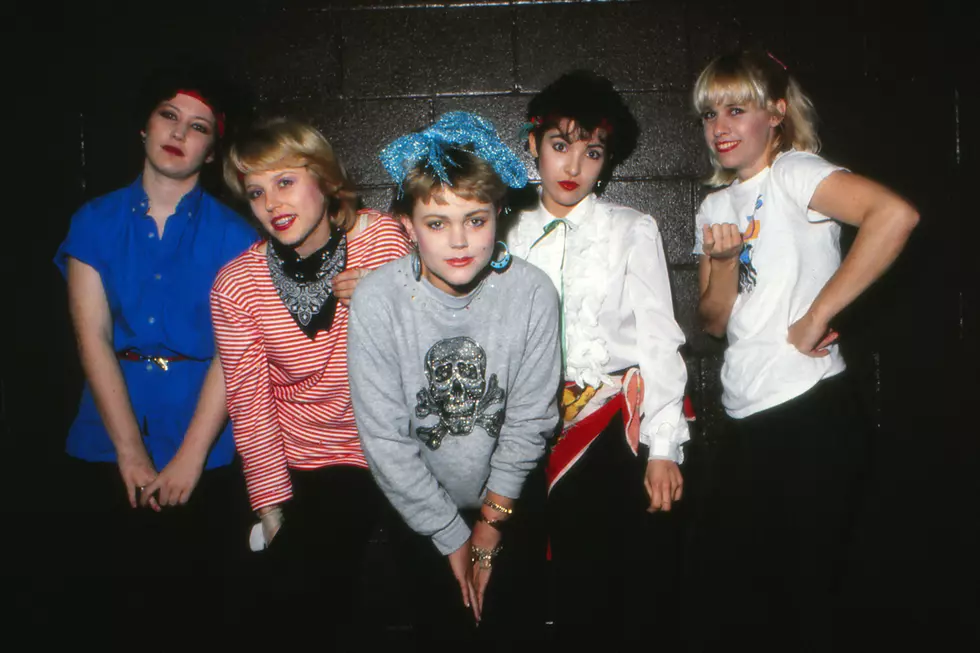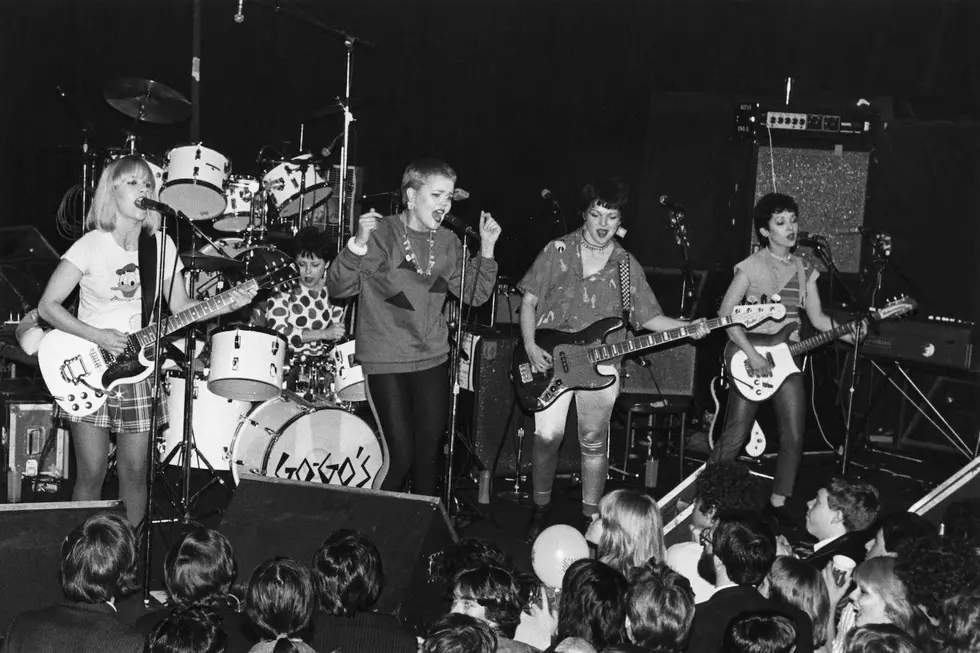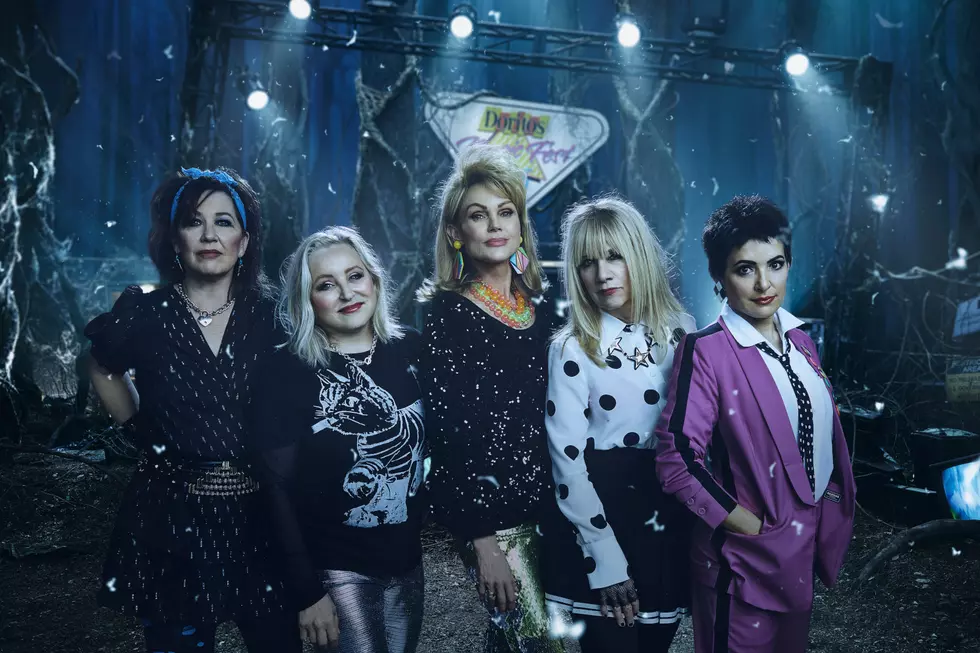
5 Reasons the Go-Go’s Should Be in the Rock and Roll Hall of Fame
There was time when an all-female group didn't write its own songs or play its own instruments. Then came the Go-Go's. They did both, while also becoming one of the biggest bands of the early MTV era.
Charlotte Caffey, Belinda Carlisle, Gina Schock, Kathy Valentine and Jane Wiedlin actually rose out of Los Angeles' late-'70s post-punk scene, but they had higher aims. "We Got the Beat," which Caffey is said to have written in basically five minutes, ensured the Go-Go's would never toil in local obscurity.
Hits like "Our Lips Are Sealed," "Head Over Heels" and "Vacation" confirmed their nervy genius with pop hooks, good looks and fearless attitude. They'd become the first – and still only – all-female group to write and record a No. 1 album.
"We had this assumption that everything was going to change – but everything didn't change," Wiedlin told Yahoo! in 2018. "Well, change comes slowly — and sexism is still alive and well in America."
The majors weren't interested at first, perhaps because they weren't being shepherded along by old-school Svengali like Kim Fowley. Early producer Richard Gottehrer, a Brill Building legend known for songs like "My Boyfriend's Back," helped shape their sound. But the Go-Go's were always their own women.
Even after their breakthrough, the Go-Go's faced withering misogyny and an odd industry indifference: They have been nominated for only one Grammy and have never won. They were eligible for the Rock & Roll Hall of Fame for 15 years before earning their first nomination.
"It bothers me a little bit because it's so obvious," Carlisle told Logo in 2018. "Do I have a theory? Yes. Somebody — it could have been me — offended somebody in some way. I've heard 'over my dead body will the Go-Go's ever be in the Hall of Fame.' So, it might be postmortem – or it might never happen. It's sexist or it's political."
They broke up too soon, exiting after just three classic-era albums, before mounting a series of reunions beginning in the '90s that yielded one more studio effort, 2001's God Bless the Go-Go's. By then, it had already become abundantly clear the Go-Go's had changed the game forever.
Female-led bands were no longer "girl groups." Instead, they could be both critically and commercially viable on their own terms. Still don't believe this band is worthy? Here are five reasons why the Go-Go's should be in the Rock & Roll Hall of Fame.
Their Influence Is Underrated
When they started out, newly signed to I.R.S. Records by Police manager Miles Copeland, the Go-Go's were slotted as an opening act. Then their debut album Beauty and the Beat raced past the Police's Ghost in the Machine to the top of the Billboard chart. History was made, as the Go-Go's became the first all-female group to write their own ticket to No. 1. But history kept being made, as their musical influence spread. Without the Go-Go's, there's no Sleater-Kinney, no Best Coast. But there's also no Green Day, no Blink-182, maybe not even Nirvana, since the band so widely popularized pop-punk.
They Overcame Everything
They endured brutal instances of sexism, actually being spit on by white-nationalist ska fans during a U.K. tour opening for the Specials and Madness. Shouts of "show your tits" were commonplace everywhere they played. "People would ask us who we had fucked to get to the top," Wiedlin lamented. The Go-Go's couldn't rely on immediate support from label execs either. Stiff Records released their first single, and "We Got the Beat" was a hit. But cofounder Dave Robinson said he wouldn't sign the Go-Go's because they were "an American punk girl band objecting to being spit at." Valentine took to describing it as being trapped in the "lady box," an unintended double entendre from which they quickly broke free.
They Were Part of an Important Movement
Don't bother looking for Los Angeles punk bands on your next trip to the Cleveland-based Rock & Roll Hall of Fame. Black Flag? Not in. X? Not in. Devo (an Ohio band that moved out West)? Not in. The Germs? Not in. Penelope Spheeris, send help. Really, however, this oversight follows a more general indifference to a city that never got the retroactive street cred of London or New York City, despite being a far more diverse scene. "There were girls in bands, people of color in bands, gays and lesbians in bands — and it was all okey dokey. It wasn't a big deal," Wiedlin told Yahoo! "It was kind of the perfect breeding ground for our little band to come into existence." Inducting the Go-Go's, who were among the founding figures in this too-often-ignored scene, would be an important step in the right direction.
They Made the Most of It
The classic Go-Go's era didn't last long, wrapping up after a three-year run on the national stage. But they still managed to score that double-platinum debut album, a gold-selling Top 10 follow-up and a Top 20 finale. They had five Top 40 singles, including a pair of Top 10 hits and another that just missed at No. 11. Sure, they also showed that an all-female band can disintegrate just like a boy band, splitting amid bouts with drugs and legal bickering. But their triumphant reunion included the well-received God Bless the Go-Go's, while their story inspired a Broadway musical and a celebrated documentary. The lockdown single "Club Zero" provided another timely reminder of their resiliency.
It's Time to Balance the Ledger
Women make up less than 10 percent of inductees in the Rock & Roll Hall of Fame. Along the way, figures like Elvis Presley have been rightly honored, but somehow not Big Mama Thornton – who first recorded "Hound Dog." To be fair, organizers have been working to correct this historical wrong, memorably inducting Stevie Nicks, Janet Jackson and Joan Jett in 2019-20. A year later, the Rock Hall unveiled the most woman-focused ballot in history, with seven female nominees – 11, if you include each individual member of the Go-Go's. (If Tina Turner and Carole King were to get the nod, they'd join Nicks as the only three female two-time inductees.)
Acts Who Should Be in the Rock & Roll Hall of Fame
More From 92.9 The Lake










